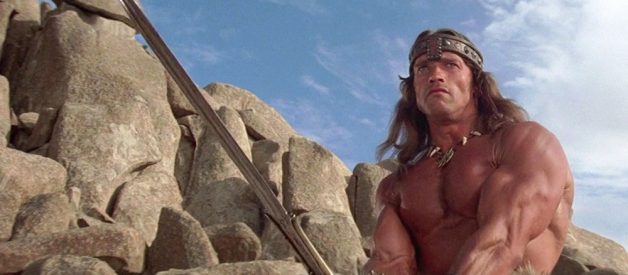Do you enjoy a film opening with the forging of a sword, struck by the blacksmiths hammer with voice over sharing the mythology of a fictional land and people and lightning effects flashing in the background? If that?s your kind of movie, Conan The Barbarian (1982) is perfect for you.
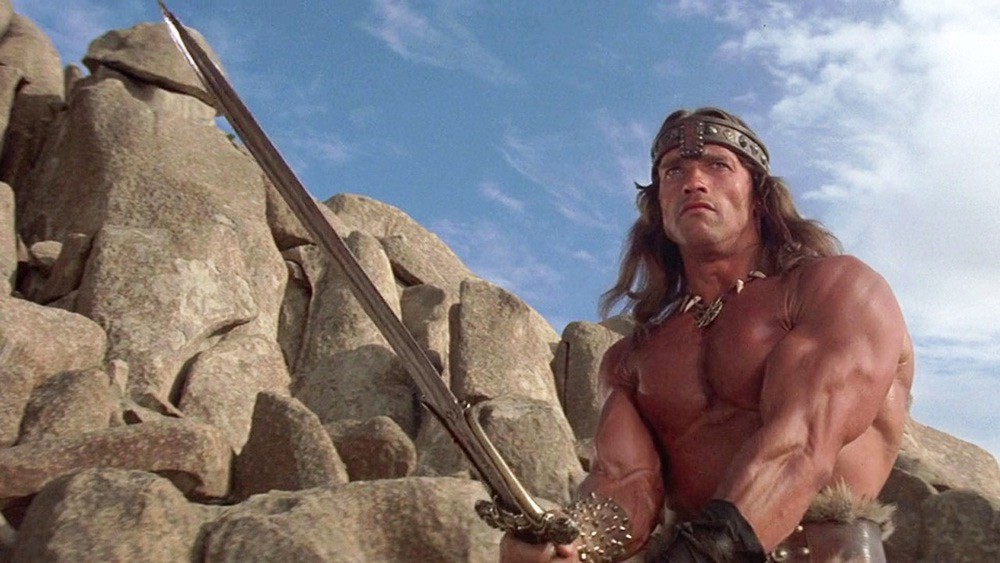 Source ? IMDB
Source ? IMDB
Conan The Barbarian (1982), stars Arnold Schwarzenegger in the titular role, as a warrior who becomes a hero defeating a snake cult lead by Thulsa Doom (James Earl Jones). For all of the incredible fantasy elements, and mixed mythology the story offers, it does provoke some intriguing ideas about the hero?s journey.
Within the story, we are presented with philosophical concepts and iconography. With literal presentations of an idea, we can extrapolate the meaning of these elements, culminating in the Riddle of Steel, the heart of Conan and his people.
The Wheel of Pain
The young Conan is taken into slavery after the massacre of his tribe and family, along with the other boys of the village.
They are all chained to a giant grinding wheel in the desert, known as The Wheel of Pain. They push, moving it forward, all the while toiling in the elements. Day by day, they push until the only one left to push is Conan.
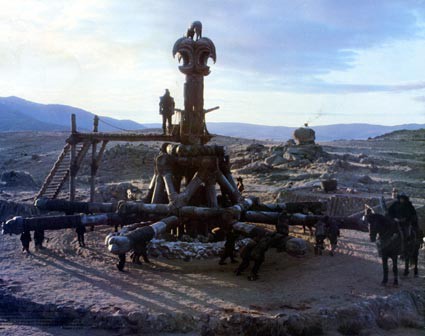 Source ? Conan.fandom
Source ? Conan.fandom
Through pushing at the wheel, picking up the slack as fewer and fewer are there to push, Conan has grown strong and tough. He becomes tough enough to be sold as a gladiator and set off on a new adventure towards his destiny.
The Wheel of Pain is a direct allegory. We each, at some time or another find ourselves chained against our will to toil and push. The effort, the exertion and the pain seem endless. It is only us and the wheel.
No profit is seen for this labor, our suffering goes without reward. It is easy to fall into a self-pitying despair absent of any hope of escape or release.
If, like Conan, we can keep pushing, we?ll find a reward. Through the suffering, pushing and pain, we have developed a strength. Through the sheer act of survival we have been forced to develop our skills, character and mental toughness to endure what others could not.
The Wheel of Pain not only serves to strengthen our weakened limbs, it also represents growing up. When tied to the wheel, Conan is but a boy, young and untrained. By the time he finishes at the wheel, he is a man, grown to full height and power. Pain matures as much as it teaches, if we were not to mature we could not take heed of its lessons.
The Tree of Woe
When his first attack on Thulsa Doom is thwarted, Conan is captured and sentenced by his nemesis to be crucified upon the Tree of Woe.
Crucifixion carries powerful religious connotations, with most people readily associating it with Jesus of Nazareth and the idea of sacrifice. Within the Norse mythology, Odin crucifies himself upon Yiggdrasil, the tree of life, in order to attain the understanding of runes and poetry.
Both of these sacrifices are willing, one dying so that many may live, the other for knowledge. While Conan isn?t being willingly crucified, but there is a sacrifice at play.
The sacrifice of Conan represents not only his dying, but also the dying of his philosophy. Until this point in the narrative, Conan has remained confident that he alone is necessary to slay his enemy. His failed attack is a failure of his philosophy, and that is what is nailed to the tree along with him.
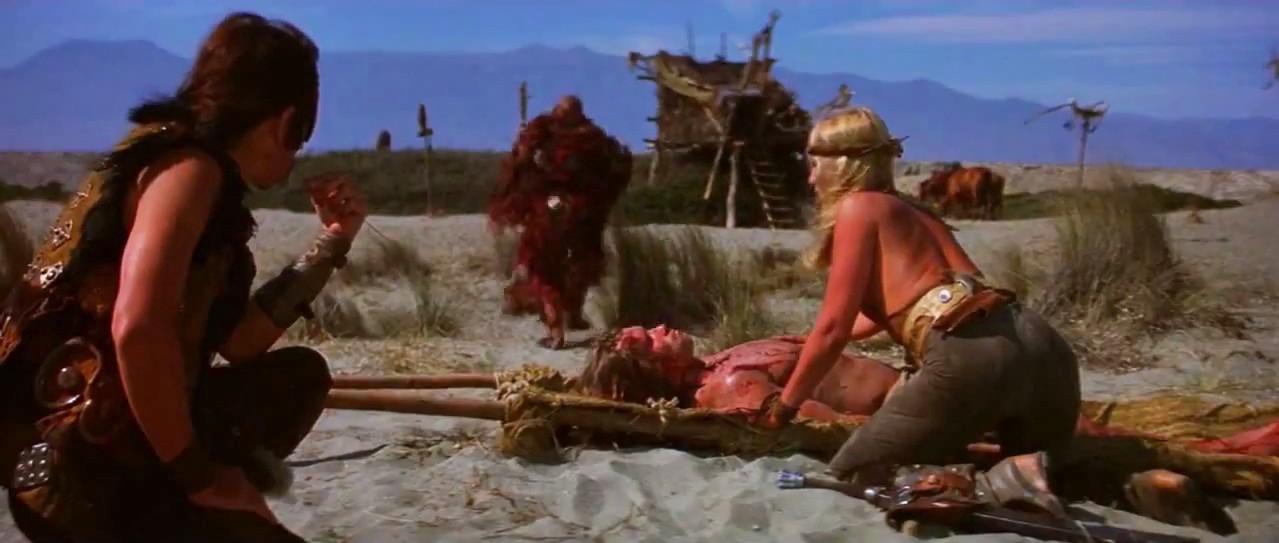 Source ? IMDB
Source ? IMDB
There?s an old saying, ?What got you here won?t get you there.? It sounds trite and fits on a bumper sticker, but there?s still truth to it. Eventually, we may find the beliefs and skills that earned our success won?t achieve our greater goals.
Conan?s single minded belief in his own strength allows him to survive the Wheel of Pain, but it doesn?t make it past the Tree of Woe. It is only by abandoning this philosophy that Conan can survive and achieve his final goal. This is amplified when the only way Conan escapes is by the help of his friends rescuing him from a certain death.
The Riddle of Steel
Everything that informs Conan?s attitude and actions is based around the Riddle of Steel, the legend of his people explaining the importance of steel to their barbarian culture.
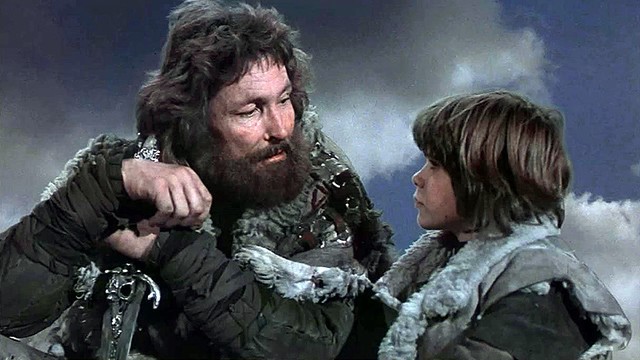 Source ? IMDB
Source ? IMDB
The film begins with Conan?s father telling him that steel was stolen from the gods by giants (a?la Prometheus), and after the battle of gods and giants it remained on earth for man to take. The story is concluded with this admonition to his young son:
?The secret of steel has always carried with it a mystery. You must learn its riddle, Conan. You must learn its discipline. For no one ? no one in this world can you trust. Not men, not women, not beasts.
[Points to sword]
This you can trust.?
This assertion is the philosophy that drives Conan?s actions in the first half of the film, it is also what allows him to become captured by Thulsa Doom.
Doom recognizes within Conan the belief in the strength of steel and mocks him, saying that he too once sought the Riddle of Steel, only to become disenchanted.
As any decent movie should, there?s a clear argument of philosophies, or worldview, between the hero and villain. Thulsa Doom doesn?t believe in the power of steel, he sees power as coming from the flesh. Taking credit for slaying Conan?s family, Thulsa insists that it is only because of the power within the flesh that the hero has made it even this far.
?Yes! You know what it is, don?t you boy? Shall I tell you? It?s the least I can do. Steel isn?t strong, boy, flesh is stronger!?What is steel compared to the hand that wields it? Look at the strength in your body, the desire in your heart, I gave you this!?
What then is the answer to the riddle? The only way Conan survives and eventually slays Thulsa doom is because of the aid of his friends. Is flesh then so much more powerful than forged steel?
The flesh is useful, it does take a hand to wield the sword against a foe, yet it will grow old and decay. Thulsa Doom, for all his power over people, couldn?t stop Conan from slaying him.
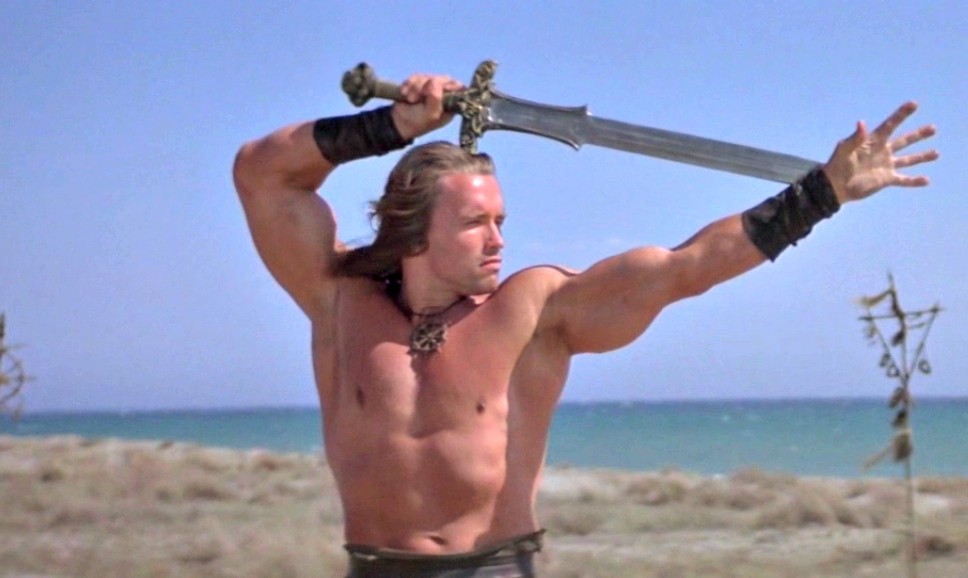 Source ? IMDB
Source ? IMDB
To answer the riddle, Conan must see that while steel will grow brittle and the flesh will age, it is will and conviction that prevail. It is by will and belief that the flesh is motivated to wield the sword, to use that sword rightly and not against the weak and unfortunate.
Steel is not elevated only through brute force, detailed craftsmanship, or even strength of your hand. Its power comes from the clear belief and conviction of the one who wields it.
